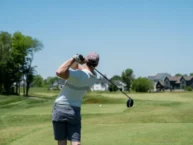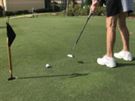I recently joined in a discussion on linkedin.com about this very issue. The original question: Do 20 handicap and above golfers really need range finders/GPS devices?
The discussion and comments that followed this question really centered on the issue of slow play. Lots of back and forth, some of it pretty raw. The low handicappers seemed to blame the devices for slow play especially when used among high handicappers. Well, duh? If you can hit the ball 250+ yards as a low handicapper and you’re behind your typical 30+ handicapper who can perhaps hit 160 yards on a good day, play is going to feel slow. But don’t blame the GPS device or the range finder for the slow play. No matter your handicap if you don’t know how to use the device and you spend time trying to find the right control button, play is going to be slower than it would be without it.
On the other hand, the high handicappers who joined the discussion appreciated the help the devices gave them to figure out distances from one point to the next and thought the information helped speed up play.
GPS stands for Global Positioning System. (An example is the uPro Go GPS by Callaway.) It is based on a space-based global navigation satellite system that provides reliable location information based on the device’s current location on Earth. With a golf GPS unit that has the information for the course you are playing stored in its memory, you can tell where you are on the golf course in relation to the green, hazards, etc., giving you accurate distance-to-the-hole data including distance to the front, middle and back of the green. At some golf courses, these GPS devices are built into the golf carts. But a lot of golfers prefer a small hand-held device they can carry in a pocket or on a belt.
Many units come pre-loaded with thousands of golf courses ready for you to use. Some of the more popular units include the Garmin Approach, SkyCaddie SGX and the OnPar Golf GPS. Prices are in the $350 – $399 range. Pricey, but loaded with special features. The one big drawback to a GPS device is that it relies on a clear signal from a satellite to work. This is rarely a problem but weather and remote locations do sometimes affect reception. Like a black hole in cell phone service, if you fall into one, then slow play is guaranteed as you try to connect with the powers above.
The second option is simpler: The Range Finder. Like a pair of binoculars or a telescope, the rangefinder is a visual device that you point at an object that you are aiming at. Range Finders using laser technology give pin-point accuracy by bouncing a beam off that distant target and then measuring the time it takes for that signal to return to the unit, which is almost instantaneous. Distance readouts are presented in a LCD display. Some of the more popular units include those manufactured by Bushnell, Nikon and Callaway. Simple features make the ranger finder easier to use than most GPS units. The prices are also lower than those or GPS units.
I particularly like the Nikon Callaway model LR 550 which is waterproof! And it’s bright yellow so you can’t miss it in your bag.
Should you get a GPS unit or a Range Finder?
The whole point of using either of these devices is to help you in judging distances and then choosing the right club for that distance. Of course, if you don’t know the distance you can hit each of your clubs, then knowing how far away you are from whatever your target is, is pretty useless. And using such a device will do nothing to help your game, and it will slow down play.
Best advice – get to the range and hit a lot of golf balls using all of your clubs. Get to know which club goes which distance. (I have friends who don’t carry a 7 wood or a 9 iron in their golf bag. Instead they have a “140 yard club” or a “75 yard club” — in other words, they know their clubs so well, and how far they can hit each of them, that they’ve given them names based on that distance. It’s second nature for them.) Once you know what your clubs can do for you, then you might consider purchasing one of these units. Until then, rely on the course markers and sprinkler heads and keep the game moving forward.
Do you own a GPS or Range Finder? Do you find it slows play or helps keep it moving? Can you recommend a unit you like?





Among the products mentioned on the list, which one is the best?
I couldn’t agree more about knowing your golf club distances – after more experience you will also be able to tell how far the target is by just looking. If you must get a gadget to help you then a rangefinder is quicker than messing around with a GPS. With regards to slow play, it shouldn’t be an issue if the slow group is holding up play then they are obliged to let the faster group play through.
The way I see it, slow play is almost never due to a golfer’s handicap or his/her skill level.
Slow play is almost always directly related to either A) lack of understanding of pace of play etiquette or B) lack of consideration for others or C) A+B
If you fully understands pace of play etiquette and you’re considerate of others you’ll never be accused of slow play… even if you’re a 32 handicap playing Winged Foot with a bunch of scratch golfers. I know, I’ve been there. :o)
That said my high-ish handicaper husband did get a GPG a while back but has never had the patience to learn how to use it, so has not put it to the test. I think I’m going to get him that Nikon Callaway range finder model. So, anyone in the market for a GPS might find his on ebay soon. ;o)
I agree with you… and some GPS devices are not worth the trouble…. I bought a GPS Ap for my iPhone… but it sucks the life out of the phone’s battery and is very fussy when it comes to connections. I tried using it a few times on the golf course, but it just slowed everything down. If I do get a device it will be a range finder. Much easier to use.